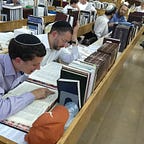Vayishlach — Why did Yaakov reject Esav’s offer of reconciliation?
The alpha male can be full of kindness, as long as you recognize who’s the boss
Decades have passed since Yaakov stole Esav’s blessing and escaped Esav’s subsequent fury. Now Yaakov is about to encounter Esav, fearful for his life and the lives of his wives and children as the news reaches him that Esav is coming to meet him with a battalion of 400 men. A fine welcoming committee!
Whether it is the elaborate tribute that Yaakov presents to a Esav, or his heartfelt prayer that he be saved from the threat he faced, or the mystical night of wrestling with the angel, Yaakov finds — remarkably — that his attempts at appeasement have worked: seeing Yaakov, Esav ran to him, hugged and kissed him, and they both wept.
So real does the reconciliation appear that Esav suggests accompanying Yaakov and his family back. Yaakov is polite, even obsequious, in his repeated demurrals:
And Esau said, “Pray, let me set aside for you some of the people who are with me [to accompany you].”
And he [Jacob] said, “Why should I find such favor in the eyes of my lord?”
(Genesis 33:15)
Throughout their exchange, Yaakov deliberately plays vassal to Esav’s liege. Robert Alter, sensitively reading the text, directs our attention to the final word, adoni: “One should note that the very last word (one word in the Hebrew) spoken by Jacob to Esau that is reported in the story is ‘my lord.’” (1) The final word he utters to his brother encapsulates Yaakov’s strategy for his encounter with Esav.
Yaakov was indeed cunning in this encounter with Esav. Esav needed to be seen as superior. Yaakov sends tribute. Esav needs to see Yaakov act subservient. Yaakov and his family bow repeatedly. And seeing Yaakov humbled brought out Esav’s sympathy.
And this applies even to chimpanzees in the jungle. Primatologist Frans de Waal rejects the cliche of the swaggering, self-confident alpha male. With primates,
[the] alpha male is a much more complex and responsible being than a bully… Most alpha males protect the underdog, keep the peace, and reassure those who are distressed… This male acts as the healer-in-chief, comforting others in agony more than anyone else in the community. As soon as a fight erupts among its members, everyone turns to him to see how he is going to handle it. He is the final arbiter, intent on restoring harmony. He will impressively stand between screaming parties, with his arms raised, until things calm down. (2)
Similarly, Esav showed a generosity of spirit — so long as Yaakov would recognize his subordinate place in Esav’s hierarchy. (A later example of Esav’s concern with his status is at the end of the parsha, when he buries Yitzchak, and is listed before Yaakov: 35:29.) Joining Esav in Seir would require acknowledging Esav as the Godfather, as did Bonasera. To do so for a brief encounter with Esav, Yaakov was willing; but to do so permanently was out of the question. Such subservience was inconsistent with the kind of family Yaakov was raising.
Just before meeting Esav, when Yaakov builds a mound to mark his final peaceful parting from Lavan at Gal-ed, twice we are told that he asked his brothers to join him: to gather stones, and then to eat with him. (4) Did Yaakov have brothers? No, Rashi says:
They are his sons, who were like brothers to him, drawing near to him for [times of] trouble or for war.
I would suggest that there is a deeper subtlety to Rashi. It is this: Yaakov’s parenting policy was to behave fraternally towards his sons. He treated them as his partners in serving God, not his inferiors. Junior partners yes — but not underlings. He led by example and then asked them to join him:
And Yaakov took a stone and set it up as a pillar. And Yaakov said to his brothers, “Gather stones.” And they fetched stones and made a mound and they ate there on the mound. (31:46)
Twelve sons with disparate personalities and often contrary ambitions ended their lives with a common loyalty to their father’s path. How? Because he also saw his sons as his brothers. With his sons, Yaakov was willing to let go of an unhealthy emphasis on status; precisely what Esav was unable to do with him.
That’s all for this week. And friends, remember: whatever the world throws at you, stay strong.
Notes
(1) Robert Alter, The Five Books of Moses: A Translation with Commentary, p 186.
(2) Frans de Waal, Mama’s Last Hug: Animal Emotions and What They Teach Us about Ourselves, p 10.
(3) A later example of Esav’s alpha male concern with his status was
(4) Translations avoid the difficulty by rendering echav אחיו as “kinsmen” or “relatives”. And Jacob said to his kinsmen, “Gather stones.” (31:46) and “He then butchered an animal on the hill, and invited his relatives to break bread.” (31:54) The Rashi cited is on the earlier verse.
